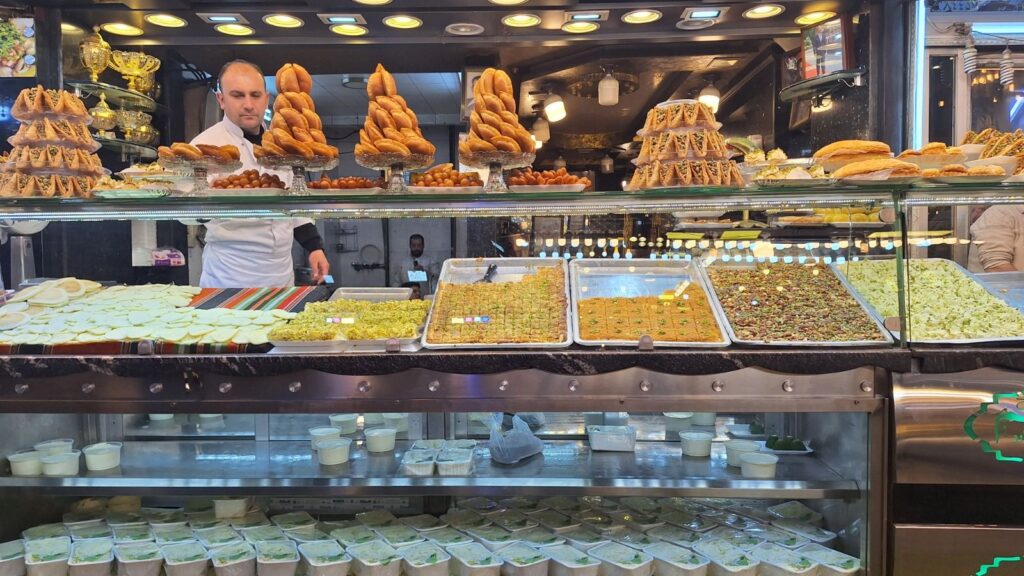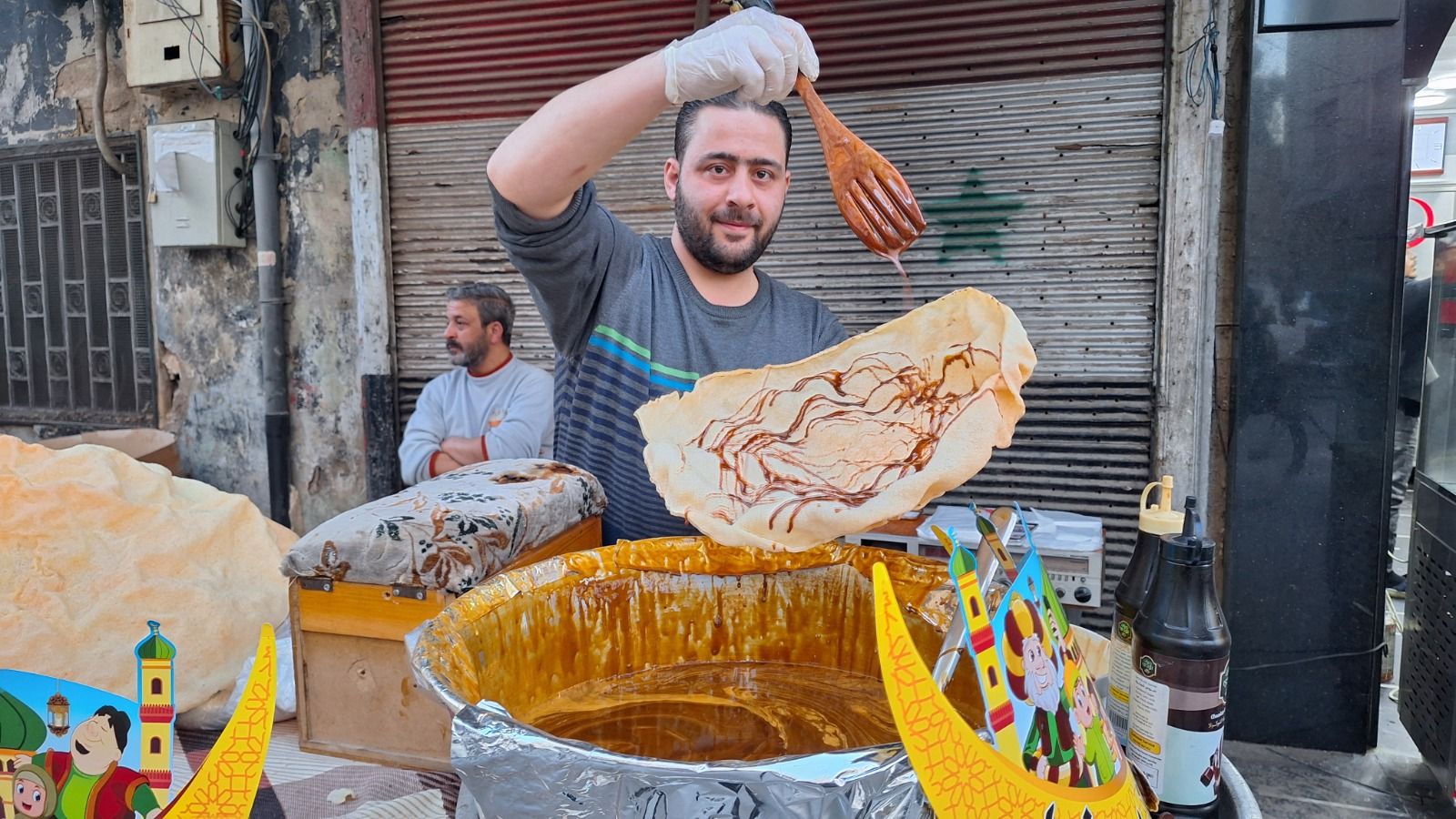Driving my car through the dark streets of Damascus in the evening, I turn on the local radio to listen to whatever programming is on. It is a show for which people call from across the country, each expressing a dire need: open-heart surgery, university tuition, housing rent, transportation costs, a wheelchair, a food basket, among others. And in response, others pledge to cover these costs. I contemplate the fact that, after more than a decade of war, we in Syria are still able to listen to one another’s pain and tend to it, even if partially.
Ramadan this year coincides with the 13th anniversary of the outbreak of protests and war in Syria, unfolding against the backdrop of an unprecedented economic crisis. Each year, we are reminded to brace ourselves for the most challenging Ramadan yet. With the gradual deterioration of living conditions for all Syrians, many find themselves unable to partake in the cherished religious and social rituals as they would wish, despite their profound and joyful significance. The economic analysis, coupled with our experiences, indicate that this year is indeed the most difficult yet. It underscores the need for us to double our efforts to find joy in this month and to support one another, whenever and however we can.
Nine in 10 Syrians live below the poverty line, according to U.N. statistics, with 15 million in need of humanitarian aid. Walking around any Syrian city today, it’s not hard to feel the real weight of these statistics. The sight of some markets, especially shortly before iftar, may seem cheerful with vendors selling traditional Ramadan sweets, drinks, juices and pastries such as naem (fried bread covered with carob molasses), marouk (brioche stuffed with sugar, dates or raisins), qatayef (sweet dumplings filled with cream or nuts), etc. Vendors take to the streets with heartwarming calls: “Come, you who are fasting … this is your medicine, those fasting. … A delightful love is naem; come and have marouk.” Yet getting closer to this scene and scrutinizing its details reveals a darker truth.
In traditional Damascus markets such as Bab Sraijeh, Bab al-Jabiya and al-Midan, street vendors report significantly lower sales this year, hardly exceeding half of last year’s. Although Damascus markets are never brimming with shoppers in the first 10 days of Ramadan, the unprecedented price hikes and the drop in income have severely limited purchasing options for many.
Some people abstain from shopping except for the most urgent necessities, and others purchase very limited quantities or even “by the piece” — a practice unfamiliar to Damascus residents, especially during Ramadan, where iftar and suhur meals traditionally feature a feast of various foods. Yet, this aspect of Ramadan has become unattainable for many. According to estimates by the local newspaper Qasioun, at the start of 2024, the average monthly cost of living for a Syrian family of five is about $850, even as many earn a monthly salary barely over $50.
Prices are estimated to have doubled compared to last year. For example, if we consider the sweets and pastries Syrians love to serve daily during Ramadan, the simplest items like basbousa cake or puff pastries can be found at about $2 per pound. A loaf of naem, made from just flour, water and molasses, is priced at about 50 cents, and a marouk cake costs a little bit more.

Given these prices, a family may need more than $30 this month just for the smallest possible portions of sweets. As for main courses, they are mostly limited to vegetables and low-cost seasonal items, with meat and chicken rarely on the menu. Street vendors also report skyrocketing costs of production, raw materials, electricity generators and gas because of a severe fuel and energy crisis. This situation has compelled them to increase prices just to cover costs, resulting in minimal profit margins.
Even the crowds we used to see in the evening hours, between iftar and suhur, have significantly diminished, especially outside the large markets and main cities. Many streets have lost their usual vibrancy and charm, with only a few shops decorating for the month with lamps, lanterns and colorful ribbons. Most families await remittances from their children and relatives abroad to get through the month and perhaps purchase some basics for Eid festivities. In fact, these remittances are a vital source of income for thousands of families and become more frequent during Ramadan. Experts estimate that at least half of Syrians rely on such remittances for their livelihood.
Remittances are one of the ways through which Syrians help each other navigate Ramadan without excessive grief, sadness or anxiety. Initiatives to distribute free iftar meals are common, such as soup kitchens, or the “Ramadan Taxi,” an initiative by a girl from rural Damascus connecting donors with those in need of decent meals. Another example is “Syrian Motorcyclists,” who distribute and deliver hundreds of hot meals in the suburbs of Damascus leading up to iftar.
One of the most heartwarming aspects of Ramadan is the gestures that reassure me that the world is still all right. There’s the tradition of sakba, in which neighbors exchange dishes before iftar or suhur as a token of community spirit, diversifying each family’s meals and reducing food waste. Despite the decline of this custom due to economic hardships and changing social dynamics in Damascus, its spirit endures during Ramadan. Walking into a market before iftar, it’s heartening to see shop and restaurant owners sharing sakba with those in need or offering small treats to passersby at the start of the sunset call to prayer. These moments bring smiles and a sense of reassurance that are scarce on ordinary days.
Grief takes various shapes. Wherever I look, families observe this month lacking joy or comfort: A woman grieves her deceased husband, her three sons having fled the war, leaving her with only a son and a daughter; another has lost all five of her children; a third family waits anxiously for any news of their son, forcibly disappeared. These are but a few of the countless stories reflecting deep heartache.
My friend, now living alone on the outskirts of Damascus after her children have moved away, tells me she hasn’t prepared any Ramadan feasts for years, simply breaking her fast with whatever is available at home. To her, Ramadan means more than fasting, food or drink; it mainly signifies family gathering. She spends time after iftar on calls with her children, who are now scattered across various countries, from Lebanon to Turkey and Europe. She remarks on how her mobile phone has become her most trusted companion, essential for keeping up with news and staying connected with her family. More than 6 million Syrians have left the country since the onset of the conflict.
A friend living in Europe shares his nostalgia for the Ramadan traditions he experienced in Syria, having been abroad for six years. He tries to replicate these rituals at home or with friends. “Ramadan in Damascus is unique,” he acknowledges. “It has a special flavor.” He asks for photos and videos of the vibrant Jazmatieh market in Damascus, famous for its dynamic scene of vendors and customers engaging in the sale of sweets, juices and food, especially in the moments before iftar.
“Visiting this market every two or three days during Ramadan was a cherished family tradition,” he says in a voice message that sounds laden with sadness and longing.
Escaping the widespread sadness during Ramadan proves difficult as we observe the continued unrest in Gaza and Palestine, now lasting over five months. For some, this situation revives memories of the intense struggles experienced during the war in Syria. The sense of pain is widespread and seemingly perpetual.
I look for glimpses of hope or joy in the faces and eyes around me, yet it’s a challenging task. A friend shares that she has opted to not linger on the past, for it brings only sadness and disappointment.
“I’m setting my sights on the future, hopeful for gentler days ahead. Maybe, in time, Ramadan will bring us some comfort and peace.”
“Spotlight” is a newsletter about underreported cultural trends and news from around the world, emailed to subscribers twice a week. Sign up here.



